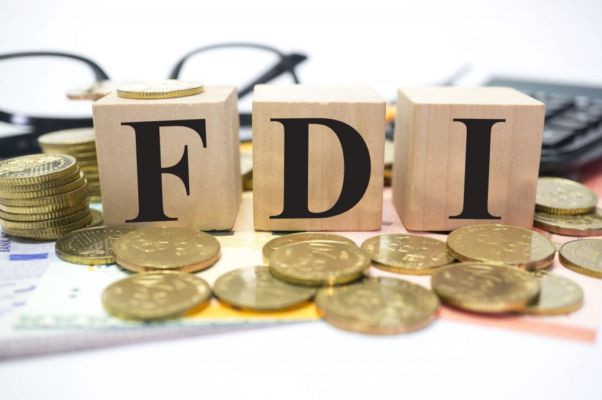India 9th largest recipient of FDI in 2019 reports UN
Kautilya Academy 19-06-2020

The UN Conference on Trade and Development (UNCTAD) reported that was the worlds 9th largest recipient of foreign direct investments (FDI) in the year 2019 in its World Investment Report 2020.
The UN Conference on Trade and Development (UNCTAD) reported that it was the world’s 9th largest recipient of foreign direct investments (FDI) in the year 2019 in its World Investment Report 2020. India has received $51 billion in foreign investment in 2019.
India received USD 51 billion in foreign investment in 2019 and was the world's 9th largest recipient of foreign direct investments (FDI) in 2019, according to a report by the UN's trade body.
The UN Conference on Trade and Development (UNCTAD) said in a report on Monday that a lower but positive economic growth in India in the post-COVID19 pandemic period and India's large market will continue to attract market-seeking investments to the country.
The UN Conference on Trade and Development (UNCTAD) said in a report on Monday that a lower but positive economic growth in India in the post-COVID19 pandemic period and India's large market will continue to attract market-seeking investments to the country.
The World Investment Report 2020 by the UNCTAD said that India was the 9th largest recipient of FDI in 2019, with 51 billion dollars of inflows during the year, an increase from the 42 billion dollars of FDI received in 2018, when India ranked 12 among the top 20 host economies in the world.
In the "developing Asia" region, India was among the top five host economies for FDI.
The report said that global FDI flows are forecast to decrease by up to 40 per cent in 2020, from their 2019 value of USD 1.54 trillion.
Foreign direct investment to developing economies in Asia, hit hard by the economic downturn caused by the coronavirus pandemic, are projected to decline by up to 45 per cent in 2020.
In South Asia, FDI is also expected to contract sharply in 2020.
"In India, the biggest FDI host in the subregion, with more than 70 per cent of inward stock, the number of greenfield investment announcements declined by four per cent in the first quarter, and Merger & Acquisitions contracted by 58.
"However, the country's economy could prove the most resilient in the region. FDI to India has been on a long-term growth trend. Positive, albeit lower, economic growth in the post-pandemic period and India's large market will continue to attract market-seeking investments to the country," the report said.
It added that the magnitude of the logistical challenges during both the lockdown and the recovery remain a big downside risk for FDI in the medium term for India.
"The digital economy and real estate and property development, two industries that attracted growing FDI before the pandemic, could evolve in different directions," the report said adding that the digital economy will likely see continued investments, real estate and property development will face "significant pressures" from slowing demand and financing constraints.
"India's most sought-after industries, which include professional services and the digital economy, could see a faster rebound as global venture capital firms and technology companies continue to show interest in India's market through acquisitions," the report said.
The report noted that investors concluded deals worth over $650 million in the first quarter of 2020, mostly in the digital sector in India.
Large deals in energy were also concluded, such as the acquisition by Total (France) of AdaniNSE 1.25 % Gas (India), valued at $800 million.
FDI flows to South Asia increased by 10 per cent to USD 57 billion in 2019, the growth driven largely by a rise in investment in India, which further relaxed investment barriers in mid-2019 (including in retail, insurance and downstream coal processing).
FDI to India, the largest South Asian recipient, increased 20 per cent to USD 51 billion, sustaining the country's upward FDI trend, the report said.
Most of the investments were in the information and communication technology and the construction industry.
ICT investments into India have evolved from information technology services for global companies to the rapidly growing local digital ecosystem, with many local and regional digital champions, particularly in e-commerce (such as Flipkart and Zomato), attracting international investment, the report said.
A number of mega deals also contributed to M&A activity. These included investments in internet companies, which amounted to USD 2.7 billion,14 as well as the USD 7 billion acquisition of Essar Steel (India) by a Japanese-Indian joint venture.
Outflows from South Asia grew 6 per cent, driven by investment from India. Yet they remained small, representing only one per cent of global outflows.
Companies in India are the subregion's largest investors, with more than 90 per cent of outflows in 2019.
Investments from India are expected to decline in 2020, with the largest MNEs revising their earnings down by 25 per cent in early 2020 due to the impact of the pandemic, it added.
The report said that flows to developing Asia will be severely affected due to their vulnerability to supply chain disruptions, the weight of global value chains-intensive FDI in the region and global pressures to diversify production locations.
In 2019, FDI flows to the region declined by 5 per cent, to USD 474 billion, despite gains in South- East Asia, China and India.
The report stressed that global FDI flows will be under severe pressure this year as a result of the COVID-19 pandemic, dropping well below the trough reached during the global financial crisis and undoing the already lackluster growth in international investment over the past decade.
Flows to developing countries will be hit especially hard, as export-oriented and commodity-linked investments are among the most seriously affected.
"The outlook is highly uncertain. Prospects depend on the duration of the health crisis and on the effectiveness of policies mitigating the pandemic's economic effects," said UNCTAD Secretary-General Mukhisa Kituyi.
Highlights:
♦ As per the report, the global FDI flows are forecast to decrease by up to 40% in 2020 against $1.54 trillion in 2019.
♦ Teh COVID-19 pandemic has hit hard the FDI to developing economies in Asia. It has been projected to decline by up to 45% in 2020.
♦ As per the forecast, India’s large market will continue to attract market-seeking investments to the country.
♦ India has received $51 billion of FDI inflows in 2019 against $42 billion of FDI received in 2018.
♦ Among the "developing Asia” region, India stands among the top five host economies for FDI.
♦ Global FDI flows are forecast to decrease by up to 40% in 2020, from their 2019 value of $1.54 trillion.
In South Asia, FDI is also expected to contract sharply in 2020.
"In India, the biggest FDI host in the subregion, with more than 70 per cent of inward stock, the number of greenfield investment announcements declined by four per cent in the first quarter, and Merger & Acquisitions contracted by 58.
"However, the country's economy could prove the most resilient in the region. FDI to India has been on a long-term growth trend. Positive, albeit lower, economic growth in the post-pandemic period and India's large market will continue to attract market-seeking investments to the country," the report said.
It added that the magnitude of the logistical challenges during both the lockdown and the recovery remain a big downside risk for FDI in the medium term for India.
"The digital economy and real estate and property development, two industries that attracted growing FDI before the pandemic, could evolve in different directions," the report said adding that the digital economy will likely see continued investments, real estate and property development will face "significant pressures" from slowing demand and financing constraints.
"India's most sought-after industries, which include professional services and the digital economy, could see a faster rebound as global venture capital firms and technology companies continue to show interest in India's market through acquisitions," the report said.
The report noted that investors concluded deals worth over $650 million in the first quarter of 2020, mostly in the digital sector in India.
Large deals in energy were also concluded, such as the acquisition by Total (France) of AdaniNSE 1.25 % Gas (India), valued at $800 million.
FDI flows to South Asia increased by 10 per cent to USD 57 billion in 2019, the growth driven largely by a rise in investment in India, which further relaxed investment barriers in mid-2019 (including in retail, insurance and downstream coal processing).
FDI to India, the largest South Asian recipient, increased 20 per cent to USD 51 billion, sustaining the country's upward FDI trend, the report said.
Most of the investments were in the information and communication technology and the construction industry.
ICT investments into India have evolved from information technology services for global companies to the rapidly growing local digital ecosystem, with many local and regional digital champions, particularly in e-commerce (such as Flipkart and Zomato), attracting international investment, the report said.
A number of mega deals also contributed to M&A activity. These included investments in internet companies, which amounted to USD 2.7 billion,14 as well as the USD 7 billion acquisition of Essar Steel (India) by a Japanese-Indian joint venture.
Outflows from South Asia grew 6 per cent, driven by investment from India. Yet they remained small, representing only one per cent of global outflows.
Companies in India are the subregion's largest investors, with more than 90 per cent of outflows in 2019.
Investments from India are expected to decline in 2020, with the largest MNEs revising their earnings down by 25 per cent in early 2020 due to the impact of the pandemic, it added.
The report said that flows to developing Asia will be severely affected due to their vulnerability to supply chain disruptions, the weight of global value chains-intensive FDI in the region and global pressures to diversify production locations.
In 2019, FDI flows to the region declined by 5 per cent, to USD 474 billion, despite gains in South- East Asia, China and India.
The report stressed that global FDI flows will be under severe pressure this year as a result of the COVID-19 pandemic, dropping well below the trough reached during the global financial crisis and undoing the already lackluster growth in international investment over the past decade.
Flows to developing countries will be hit especially hard, as export-oriented and commodity-linked investments are among the most seriously affected.
"The outlook is highly uncertain. Prospects depend on the duration of the health crisis and on the effectiveness of policies mitigating the pandemic's economic effects," said UNCTAD Secretary-General Mukhisa Kituyi.
Highlights:
♦ As per the report, the global FDI flows are forecast to decrease by up to 40% in 2020 against $1.54 trillion in 2019.
♦ Teh COVID-19 pandemic has hit hard the FDI to developing economies in Asia. It has been projected to decline by up to 45% in 2020.
♦ As per the forecast, India’s large market will continue to attract market-seeking investments to the country.
♦ India has received $51 billion of FDI inflows in 2019 against $42 billion of FDI received in 2018.
♦ Among the "developing Asia” region, India stands among the top five host economies for FDI.
♦ Global FDI flows are forecast to decrease by up to 40% in 2020, from their 2019 value of $1.54 trillion.




